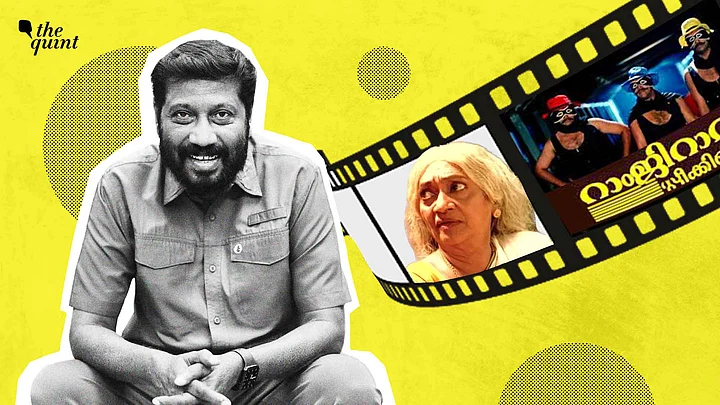The 1980s is what is deemed the 'golden era' of Malayalam cinema. The movies that went on to become cult classics were born in this era – from Hariharan and MT Vasudevan Nair's Oru Vadakkan Veeragatha to Padmarajan's Thoovanathumbikal.
In this decade, Malayalam cinema found a new footing as well as two new superstars – Mammootty and Mohanlal. Most of the stellar successes of the time came from established directors and writers, who banked on the acting chops and popularity of these two actors.
But it was during the pinnacle of this trend that a 20-something director duo from Cochin made a film with no A-listers, fully relying on their well-rounded, fresh script and making the best use of the incredibly talented character actors on whose shoulders Malayalam cinema stood tall, up until recently.
Ramji Rao Speaking hit the theatres in 1989, and with it, directors Siddique and Lal introduced Malayali filmgoers to a new cinematic experience – the one that did not need big names or stars, but had an array of well-written characters on screen who shared the audience's struggles.
The film explored the many layers of friendship of the characters, human goodness, frivolity, and ego – all tied together with dialogue humour and witty counters that left the viewer's stomach in knots.
For a non-Malayali audience, too, this experience may be familiar – as it was Siddique-Lal's Ramji Rao Speaking that was later remade into Bollywood cult classic Hera Pheri.
Now, with the demise of Siddique Ismail of the Siddique-Lal duo, Indian cinema – and not just Malayalam cinema – has truly lost a master of this craft.
Siddique passed away on Tuesday, 8 August, at age 63, after suffering a cardiac arrest. He was laid to rest at the Ernakulam Central Juma Masjid with full state honours.
Not Your Run-of-the-Mill Characters
At a time when heroism and villainy often mirrored a David versus Goliath trope, Siddique-Lal placed Anappara Achamma, a small-framed, grey-haired old woman, played by the phenomenal Philomena, against a 70+ patriarch Anjooran played by theatre stalwart NN Pilla.
Both the characters were written brilliantly in varying shades of grey – juxtaposed in a family drama with comedy, romance, and fights.
What Malayalam cinema then got was not only one of the most iconic of its characters but also one of the biggest blockbusters till date – Godfather, which ran in theatres for more than 400 days!
Siddique-Lal's movies, despite playing an important role in shaping the landscape of humour in Malayalam cinema, could not just be classified as comedies. It had always been filled with moments that made the viewers emotional.
They have also given Malayalam some of its iconic villains such as the titular character of their debut movie Ramji Rao Speaking played by Vijaya Raghavan and John Honai played by the late Riza Bawa.
The women in Siddique-Lal movies were not the cookie-cutter mould average heroine, whose only purpose was to romance the hero. They were breadwinners of their families, like Rani played by Rekha from Ramji Rao Speaking who was desperately in need of holding on to her job.
They were women on a mission like Maya from In Harihar Nagar and Stella from Mannar Mathai Speaking, without whom those stories could not be told.
Films That Transcended Boundaries
Siddique's independent directorial ventures like Friends, Hitler, Chronic Bachelor, and Bodyguard were massive hits as well, and were remade in different languages.
Siddique made his debut in Bollywood in 2011 with the Hindi remake of Bodyguard, starring Kareena Kapoor and Salman Khan, which again was a blockbuster.
Siddique's stories transcended time and terrain; a testament to that is the fervent success of Hera Pheri and Hul Chul, which were remade into Hindi from Ramji Rao Speaking and Godfather, respectively.
Siddique has directed Friends and various other independent movies of his in Tamil, which also went onto become huge successes, proving that the backbone of any movie is its story and that no one told it better than Siddique.
He was a director who not only knew the formula to make movies a commercial success, but weaved magic into his films that it carved a special place in the heart of the audience.
Beyond all that, for every Malayali, Siddique is a part of their everyday life.
There is not a single day in a Malayali household that would go without someone reacting to some situation with one of his iconic dialogues. Such was the effect his scripts and movies had on the audience, making his dialogues an integral part of the Malayali lexicon.
They made him immortal in the hearts of every Malayali.
(Meenakshi Sajeev is a Bengaluru-based freelance writer. This is an opinion article and the views expressed are the author's own. The Quint neither endorses nor is responsible for them.)
(At The Quint, we question everything. Play an active role in shaping our journalism by becoming a member today.)
